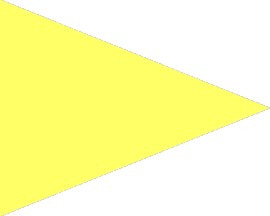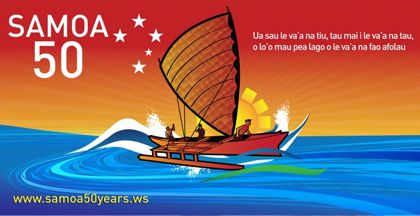![[Samoa]](../images/w/ws.gif) image by Zoltan
Horvath, 14 September 2024
image by Zoltan
Horvath, 14 September 2024Proportions: 1:2
Usage Code:

Last modified: 2024-10-12 by ian macdonald
Keywords: samoa | star (5) | southern cross |
Links: FOTW homepage |
search |
disclaimer and copyright |
write us |
mirrors
![[Samoa]](../images/w/ws.gif) image by Zoltan
Horvath, 14 September 2024
image by Zoltan
Horvath, 14 September 2024
Proportions: 1:2
Usage Code: ![]()
On this page:
Samoa: Index of Pages
See also:
![[Construction sheet]](../images/w/ws'.gif) image by Željko Heimer, 08 January 2003
image by Željko Heimer, 08 January 2003
Flag info and construction details from the official site http://www.govt.ws/gi_details.cfm?gi_id=006.
Red, the first quarter blue and bearing thereon five white regular five-rayed stars representing the Southern Cross the size and disposition of the stars being as follows:
1. In this prescription the hoist of the flag from top to bottom is regarded as 144 vertical units and its breadth from side to side as 288 horizontal units.
2. Each star has its upper most point on a vertical line through its center.
3. Two of the stars are disposed with their centers on a vertical line by setting the blue quarter. The top point of the upper star and bottom point of the lower star are distant 3 vertical units from the upper and lower edges of the blue quarter respectively.
4. The star nearest the staff has its top point distant 21 vertical units from the upper edge of the flag and its nearest point distant 42 horizontal units from the edge nearest the staff.
5. The star nearest the fly has its top point distant 18 vertical units from the upper edge of the flag and its nearest point distant 42 horizontal units from the fly edge of the blue quarter.
6. The fifth star has its bottom points distant 26 vertical unit from the lower edge of the blue quarter and its nearest point distant 56 horizontal units from the fly edge of the blue quarter.
7. The star nearest the fly edge measures 15, the top most star and the star nearest the staff 16, the lowest star 20 and the fifth star 10 vertical units measured from the point of any ray to the point of the next ray but one.
Coat of Arms info from same site http://www.samoa.ws/govtsamoapress/crest.htm.
Dov Gutterman, 22 June 2002A silver shield with the lower two thirds blue, having thereon five silver stars representing the constellation of the Southern Cross, of the same shape and the same relative sizes and dispositions among themselves as in the Flag of Samoa; one half of the upper third depicting a green sea with a green coconut palm issuing there from; the shield being surmounted by a gold cross, and superimposed on 2 concentric circles of the world and the olive leaves as in the United Nations Badge, and bearing the subscription of the motto "Faavae i le Atua Samoa", meaning in the English language "God be the Foundation of Samoa", the whole being contained within surrounding concentric circles between which are inscribed the words " The Public Seal of the Independent State of Samoa."
There is a Flag and National Anthem of Samoa Act 1994 with very detailed description of the flag, but color specification and illustration are not given: https://www.mjca.gov.ws/achasoso/2021/05/Official-Flag-and-National-Anthem-of-Samoa-Act-1994.pdf
There is no official source that gives exact colors of the national flag;
these listed below are all approximate colors from the documented sources.
Zoltan Horvath, 14 September 2024
The protocol manual for the London 2012
Olympics (Flags and Anthems Manual London 2012) provides
recommendations for national flag designs. Each NOC was sent an image of the
flag, including the PMS shades, for their approval by LOCOG. Once this was
obtained, LOCOG produced a 60 x 90 cm version of the flag for further approval.
So, while these specs may not be the official, government, version of each flag,
they are certainly what the NOC believed the flag to be.
For Samoa: PMS 281
blue, 032 red. The vertical flag is simply the horizontal version turned 90
degrees clockwise.
Ian Sumner, 11 October 2012
The Flag Manual - Beijing 2008 gives Pantone colors: PMS 032 (red), and PMS
281 (blue).
The Album des Pavillons 2000 [pay00]
(Corr. No. 6.) gives approximate colors in Pantone and CMYK systems:
Red:
Pantone 186c, CMYK 0-90-80-5
Blue: Pantone 294c, CMYK 100-50-0-20
The Album des Pavillons 2023 specifies the colors of the flags in three
color systems:
Blue: Pantone 294c, CMYK 100-84-26-6, RGB 0-53-128
Red:
Pantone 186c, CMYK 10-100-74-2, RGB 210-16-52
Vexilla Mundi gives colors in Pantone
system: PMS Black, PMS 186C (red), PMS 280C (blue), and PMS White.
Wikipedia illustrates the
flag, and construction details, but doesn’t give any color specification.
Flag Color Codes gives the following color values:
Blue: Hex # 002B7F, RGB 0-43-127, CMYK 100-78-0-57, Pantone 281, RAL
5002
White: Hex #FFFFFF, RGB 255-255-255, CMYK 0-0-0-0
Red: Hex # CE1126,
RGB 206-17-38, CMYK 0-90-76-0, Pantone 032, RAL 3028
Zoltan Horvath, 14 September 2024
![[Samoa]](../images/w/ws).gif) image by Zoltan
Horvath, 14 September 2024
image by Zoltan
Horvath, 14 September 2024
A silver shield with the lower two-thirds blue, having thereon 5 silver
stars representing the constellation of the Southern Cross, of the same
shape and the same relative sizes and dispositions among themselves as in
the Flag of Samoa; one half of the upper third depicting a green sea with a
green coconut palm issuing therefrom; the shield being surmounted by a gold
cross, and superimposed on 2 concentric circles of the world and the olive
leaves as in the United Nations Badge, and bearing the subscription of the
motto "Fa'avae i Le Atua Samoa", meaning in the English language "God be the
Foundation of Samoa", the whole being contained within surrounding
concentric circles between which are inscribed the words "The Public Seal of
the Independent State of Samoa.
The coat of arms takes its
inspiration from the United Nations, as New Zealand administered Western
Samoa first as a League of Nations Mandate and then as a United Nations
trusteeship until the country received its independence on 1 January 1962,
as Western Samoa. Samoa was the first Polynesian nation to reestablish
independence in the 20th century.
The coat of arms has been used
since 1 January 1962.
Zoltan
Horvath, 14 September 2024
Flottes de Combat 2002 (French equivalent to Jane's) presents a photo of
Samoan Patrol ship Nafanua. She flies as an Ensign a blue 1:2
rectangle with a white symbol in the middle. The scale of the photo is not
sufficient to say more.
Armand Noel du Payrat, 24 July 2002
Based on the description this must be the Samoa Police Service
flag as used on patrol vessels. Samoa doesn’t have a Navy.
Zoltan
Horvath, 14 September 2024
![[Samoa]](../images/w/ws_scs.gif) image by Zoltan
Horvath, 14 September 2024
image by Zoltan
Horvath, 14 September 2024
The Customs Act 2014 prescribes a Customs flag at Section 8. 'Customs
flag - The Customs flag is the Samoa flag, with the addition in the fly of
the words "Samoa Customs Service" in bold characters.'
Jeff Thomson,
23 November 2015
I haven’t found any image of this flag. It is based on only written
source, it is defined in Customs Act 1984:
https://samoa.tradeportal.org/media/Customs%20Act%202014.pdf
Zoltan
Horvath, 14 September 2024
 image by Eugene Ipavec, 21 December 2007
image by Eugene Ipavec, 21 December 2007
Samoa uses one signal which is a flag
35a: yellow pennant meaning “Storm/hurricane alert. A tropical cyclone of storm
or hurricane intensity exists and may affect the locality within 24 or 36
hours.
Jan Mertens, 30 March 2008
 image located by Vanja Poposki, 7 August 2012
image located by Vanja Poposki, 7 August 2012
Source:
http://www.3news.co.nz/Samoas-50th-kicks-off
Just been watching a very interesting programme on the 50th anniversary
of Samoan independence. About a third to halfway through the 40 minute programme
there were scenes from the 50th anniversary celebrations which included quite a
large number of flags which i don't think have been reported here (sadly, they
are only fleetingly seen). It appears that the jubilee had its own flag, a
complicated realistic image of a vaka (outrigger canoe) on a predominantly
orange background, which is also shown. The full programme can be seen at TVNZ's
website here:
http://tvnz.co.nz/tagata-pasifika/s2012-ep20-video-4946695 [available only
in New Zealand].
James Dignan, 28 June 2012
Another cloth on building is here:
http://www.radioaustralia.net.au/international/2012-06-01/china-a-better-pacific-friend-than-us-samoan-pm/953518.
There may well be others. This, in my opinion, is just decoration with various
lay-outs of the 50-years logo.
Peter Hans van den Muijzenberg, 21
December 2012